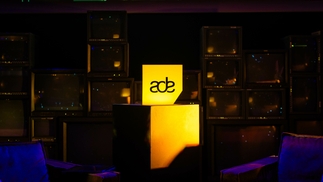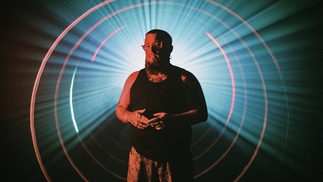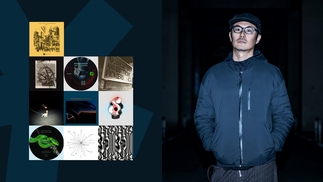ON THE ROAD WITH... ALAN FITZPATRICK
With a mix about to drop in Fabric's celebrated series, DJ Mag joins Alan on the road...
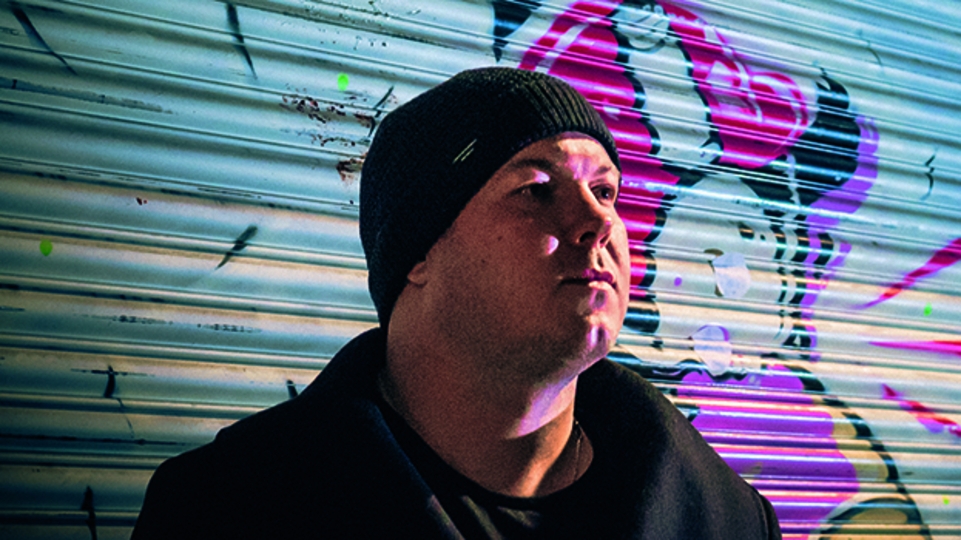
We’re standing behind the booth, staring at an endless sea of Glaswegians bathed in strobes — baying for more. Or that’s what it sounds like, beneath the thunderous techno banging out of SWG3‘s heavyweight system. Atmosphere like this is far from everyday, but it’s not everyday that one of the most in-demand players on the scene closes Slam’s legendary monthly, Pressure.
It’s fitting that DJ Mag’s adventure with Alan Fitzpatrick coincides with the final mastering of his addition to the rite of passage Fabric mix series. Opening with snippets of atmospheric ambience, before deep broken beats filter through, this patient intro belies the juggernauts that follow, and mirrors Alan’s rise to prominence.
Over a decade on the decks began with sessions in his native Southampton, slowly giving way to time spent as a Drumcode up and comer. This in turn lead to his current status as an international headliner, laying claim to collaborations with the likes of Roisin Murphy and Leftfield in recent times. Proudly confessing to creating the new Fabric compilation in one take, you could say he’s serious about Doing Things Properly.
“The best way to deal with putting the album together turned out to be getting in the studio, putting the decks on and having a fucking mix,” he tells DJ Mag. “That’s the only natural way to do what you do.
“Obviously people aren’t necessarily going to listen to it at a party — they might be on their way to work in the morning or whatever,” he continues. “So I wanted to capture their attention. But the most important thing to me was that it represents what I play out. With a mix album some people go all artsy, and come out with something weird as fuck.
I didn’t want that — to have people come check me out, and then be disappointed. It time-stamps where I’m at right now. Hopefully it will still be relevant in ten years, too.”
When DJ Mag first meets Alan on this trip, it takes seconds to draw assumptions. Finding him hunched over a laptop preparing edits for that muscular set to come, locked away in a hotel room, the scene is at odds with fantasies of touring DJs. The collared shirt, smart black jumper and denim jeans suggest that those looking for an attention-grabbing performer, surrounded by substances and debauched flesh, should move on.
“I’ve just had three weeks off, which has been nice, chilled,” he says. “It was supposed to be two, but visa complications meant I couldn’t go to LA, or Washington. That gig was cancelled anyway because of all the storms, so it was a blessing in disguise. I’ve been spending time with my kids, and I’ve just got a new puppy — Bentley, an English bulldog — so that’s been keeping me busy.
“Last year was such a mental year — so much touring, so much new music,” he exclaims. “It’s easy to get caught up in it. I’ve got a boy and girl at home — nearly six and two-years-old — and my wife, so I’ve been reflecting on that a lot really and trying to change things up this year.
Not working every Friday, so at least getting a couple of extra nights at home, and I take a weekend off every quarter now, to break it up a bit. Sometimes I’ve had 15 or 16 gigs in a month. That ain’t happening anymore.”

STATURE
Despite what this might suggest, it’s far from fatigue. Aside from having his priorities right — family, friends, some degree of normality between transcontinental pay-cheques and making his own homebrew beer — Fitzpatrick is finally embracing his stature. And that’s not a reference to those broad shoulders, or the inches in height he has on us.
“Early on, when you’re first trying to make it as a DJ and you sign to big labels, start doing showcase tours, you’re playing music and enjoying what you’re doing, but you’re not fully free really. Now I’m playing a lot more for myself too, and that’s a big factor. If I found a track from the ‘90s that I used to love, I think ‘Fuck it, I’m playing it’.
“I can’t really say when I wouldn’t have done that, but it might not have happened,” he adds. “I would have worried it wouldn’t fit. Now I’ll make it fit... Ultimately, I want it to be fun. I’ve always played stuff I like, but not necessarily dug into my own past that much. Now there could be some old rave track in there.”
Call it assurance, or hard-earned self-belief, either way it’s impossible not to notice that this is a guy at the top of his game, who no longer feels pressure to jump at every opportunity. Instead, he prefers to consider actions properly, and make the kind of choices only available to those who have put the hours in.
“I’ve definitely got the confidence now not to take on every gig,” he tells us. “You know this might be a good gig, and this might be a good gig, but that won’t. When you’re juggling studio time, home time and playing out, what’s the point in doing stuff that you don’t want? It’s a fortunate position, being able to pick and choose a bit more.
“Ultimately, I think when you’re playing confidently, and at your best, then all the other stuff comes,” he continues. “That natural performance attitude — people pick that up. I was playing and making some of the best music I ever have at the back end of 2014 — big tracks like the Trus’me remix (‘I Want You’), which was massive in Ibiza. Coming from that, it sort of spurred on last year’s madness, and then that continues to flow through.”
It’s a stark contrast from where it all began — somewhere where, in places, Fitzpatrick isn’t willing — or able — to forget in a hurry.
“Yeah, it’s nuts, quite difficult to get your head round,” he begins. “Roughly, well pretty much exactly 15 years ago — I was about 17 when I was first going out clubbing — we used to go down Bournemouth, to Slinky. So you’re on that side of the fence as a punter, now you’re the DJ. It’s a bit mad really.
“It was very different then — a bit more raw,” he recalls. “No phones to stop you losing your mates meant having mental nights alone enjoying the music. I got the bug from that, and got hooked on wanting to get involved in dance music. I didn’t straight away think ‘I want to be the next Sasha’ or whatever, seeing them play at the time. It was buying decks and messing about with them — a natural way of progressing.”
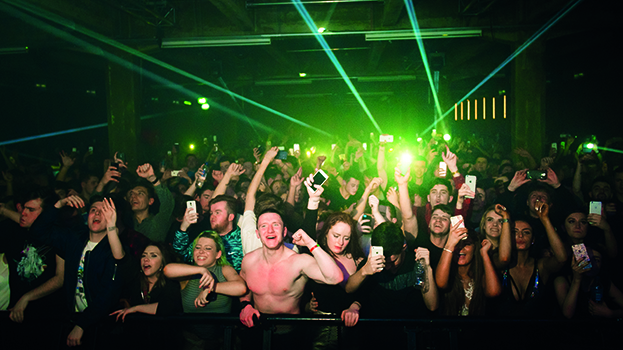
LEVEL-HEADED
For such an established fixture on the world circuit, where he places himself in the grand scheme is perhaps surprising. It’s certainly reassuring.
“Critiquing yourself is very hard,” he reckons, “especially when you’re in this sort of bubble of what you do. Looking at it from the outside isn’t easy. I’ll be having a down day, about anything, and speak to management and get told ‘Think about what you’ve achieved’. You never really take that on board.
“I don’t think the feeling of being a kid trying to make it ever really leaves you, though. It’s probably quite worrying if you ever look at yourself and think ‘Yeah, I’m one of the world’s biggest DJs’ — something’s going on there. To my mates I’m just me, they think it’s weird if they come to a club and people come to speak to me, or whatever. They still rip the back out of me.”
It’s important not to cast false aspersions, of course. As level-headed as the man in question appears, there’s nothing if not big ideas being formed in his mind. No longer simply a name on another guy’s roster, paths of his own devising are being forged, and for longer than the immediate future.
“I’m running a label now with Reset Robot and Rhymos,” he explains. “It’s just fun really, we’re three mates that have been mates since we were 14 or 15 years old. Aaron, Rhymos, is from Southampton; David, Reset Robot, used to live in Southampton, then moved to Portsmouth just before the end of secondary school. They are rival cities — they hate each other. Anyway, we’ve got to the situation where we’re all at certain levels and the time felt right to do something for ourselves.
“There isn’t really a music policy to the label,” he adds. “If we like something collectively, then we put it out. So it’s very loose — an ambient release, a techno release, whatever. Trying to push the boundaries a bit, really. And I’ve also got my vinyl-only label — ESD; Explore Search Discover — and that’s just for the love of having something physical. There’s a coloured vinyl for each release, no promo involved. We’ve re-pressed a couple but generally only 300 copies are made every time. So when it’s gone, it’s gone.”
ALBUM
Inspired, rather than overwhelmed, by the possibilities currently on his doorstep, Alan’s attitude — where (almost) anything might be possible — is infectious. “I want to get involved in clothes,” he tells us. “And, ideally, I want to get involved in making scores for film and TV. I don’t want to be DJing when I’m 50, and everyone in the club is 18. For me, that’s not a good look. For others it’s fine. It’s a personal thing.
“Maybe that’s bollocks,” he reflects. “You might be interviewing me in 20 years and say, ‘Alan, remember when you said you wouldn’t still be here?’ And I’ll sit there and think, ‘Yeah’. But there are so many other things I want to get involved in. I’ll never stop releasing things until the day I die, but there’s so much other cool stuff to do. I’m a sound designer, I like making sounds, so the concept of taking that somewhere else is interesting. Films like Drive, the soundtrack is so good, and there are so many electronic producers involved in that type of thing. For me, music, fashion, and art all blend into the same areas.”
There are already signs of movement away from the relentless nature of 130+bpm events, into avenues less synonymous with wide-eyed sleeplessness. There’s a new album approaching completion, and a wry smile spreading on Fitzpatrick’s face as he spills a few beans — like the proud father of an unexpected child.
“If people are looking for an album of just techno, then it isn’t going to happen,” he declares. “My first LP was like that — this one is a lot more diverse. I use Warp Records as a reference point to make people start thinking about what it might be like. All my EPs are club tracks, all my future EPs will pretty much be along the same lines. So this second album is based around what I can actually do musically. It’s not made for you to take tracks out of it and play them in a club — some you will, but that’s not really the concept here.”
When passions become professions, threatening to turn a love into a job, curveballs count for much. Breathing fresh life into what otherwise might start to feel tired, with Fitzpatrick there’s a tangible sense of wanting to break out from the tested, and rekindle some of what has been lost from a culture that began as a party for enthusiasts, but is now a multi-million-pound global beast.
“Sometimes I look at the whole scene and think that it’s just like a machine, going in this direction then that,” he says. “Certain labels have got eight releases planned ahead of the current one. There’s no spontaneity there. Nobody thinks, ‘I’ve made this track today, I’m putting it out tomorrow’. There has to be this big massive meal of stuff. And I don’t think everyone speaks their mind all the time. It’s a funny time.
Alan is clearly a man who thinks a lot about his craft. “When I had the time off this month, I was just thinking about stuff to do that will make things a bit different, or maybe just more interesting,” he says. “Things like put music out for free, maybe with a website link and it’s available for ten minutes, and then it’s gone. So those people that were there will have it, everyone else misses it. That’s exciting for me.
“I’m also going to do some tape stuff too,” he continues. “I was massively influenced by old tape-packs — Dreamscape, Helter Skelter. I’ve still got tape decks. Everyone knows there’s loads of rave edges to what I play. The Fabric mix drops into ravey stuff in the middle. So it’ll be the F Series, maybe 100 or 150 tapes, and other than on that cassette the music won’t ever be available anywhere else.”
Nothing if not brimming with ideas, in an industry often dominated by flash-in-the-pan superstars — here today, nowhere next year — seeing his newcomer image slowly shed, Fitzpatrick is finally focusing on standing alone after a lengthy spell of heads-down perseverance. This should be more than a little encouraging to those aspiring to make it happen, whatever ‘it’ is, but who are disheartened by gimmicks, bandwagons and hoops. Not that the man in question would welcome anything close to placement on a pedestal.
“To me, I’m just a bloke who makes music, really,” he says as he heads out towards the decks. “When I’m in a club I’m half on the dancefloor as a punter, like I was years back, even when I’m on stage playing.”
We see this in action later. Bathed in the blue hue of a single spotlight, hurling beats out to the expectant Scottish crowd, the energy emitted from the booth is tangible. Alan rocks Pressure to its core.
*'Fabric 87: Mixed by Alan Fitzpatrick' is out on April 15th.

Words: Martin Guttridge-Hewitt
